
When you are a seller or a listing agent for a property, there are pros and cons to receiving an offer that includes FHA financing. Since the Great Recession, most listing agents have been displeased to see FHA offers. There are many reasons for this. One is that FHA (and VA) appraisers seem to often be more strict on values. This can be a challenge in an escalating, competitive market. Another is that FHA/VA appraisers are more likely to require certain repairs than other appraisers.
However, there is one situation where FHA loans are a welcome feature. It’s when you receive an FHA offer on a condominium that is already on the HUD-Approved Condos list. In this instance, everyone knows that the underwriting process will be smooth sailing and the dreaded Condo Questionnaire process which is often required on many Fannie/Freddie conventional loans can be skipped.
Years ago FHA had a spot-approval process for condos that weren’t on the HUD-approved list, but the recession loan contraction took that process away. Finally, on October 15th, the FHA spot approval process is back.
Under the new rule, FHA borrowers can obtain Single Unit Approval (SUA) on non-HUD approved condominium properties that meet the following requirements:
- at least five total units in complex;
- limited to 50% concentration of FHA-insured units;
- at least 50 percent owner-occupancy;
- a maximum of 35 percent commercial space
The return of SUA will increase existing supply and offer many more affordable homeownership opportunities for FHA borrowers.
Re-Certification Requirements
HUD has also increased the certification period for FHA condominium properties from two to three years, with an additional six-month grace period after the certification end date to submit re-certification materials. Giving each condominium property an additional 12 months of approval plus a six-month grace period for submitting re-certification materials will reduce costly and time-consuming efforts condominium associations face to maintain FHA approval. In addition, condominium associations will continue to be able to submit an updated re-certification package rather than the full certification package each time. NAR anticipates many more condominium properties will apply for FHA eligibility with these changes, greatly improving access to affordable housing for many households.
Commercial Space
HUD has increased the commercial space allowed in an FHA approved condominium property from 25 to 35 percent and will allow exceptions up to 49 percent. HUD has the discretion to issue mortgagee letters to change the allowable commercial space to be within 25 and 55 percent, if necessary. NAR urged HUD to increase the allowable commercial space in a given property as more and more buyers are looking to live in areas with a variety of housing, retail and public transportation options. Increasing the allowed commercial space should also enable more properties to become FHA-approved, increasing general housing supply in many areas.
Owner-Occupancy Requirement
The current owner-occupancy requirement is 50 percent. For properties that are over 12 months old with less than 10 percent of their units in arrears, HUD may approve an owner-occupancy level as low as 35 percent. This removes the previous onerous requirement that properties demonstrate reserves at 20 percent or higher to allow for reduced owner-occupancy. Under the final rule, HUD has the ability to establish a different owner-occupancy level by mortgagee letter between 30 and 75 percent, which allows for much more flexibility in responding to changing market needs.
FHA Concentration
The current maximum FHA insurance concentration is no more than 50 percent of units. Under the final rule, HUD has the ability to establish a different FHA concentration level by mortgagee letter between 25 and 75 percent, to allow for a quicker response to changes in the real estate market.
Single Investor Ownership
Currently, a single investor in an FHA approved property can own up to 10 percent of individual units in condominium properties with more than 20 units. For properties with less than 20 units, a single investor may own no more than one unit. For single unit approval, a single investor may own no more than 10 percent of the units in properties with 20 or more units, and no more than one unit in a property with less than 20 units.
Getting Started
To begin the SUA process, you will need to start with your loan officer. Your LO will need to be with an FHA-approved mortgage broker. In Nashville, we recommend Mary Littleton with Accurate Mortgage.

